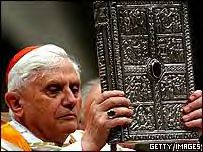
Profile: Pope Benedict XVI
As a cardinal, Pope Benedict took an uncompromising stance
Pope Benedict XVI was elected in April 2005, after the death of his predecessor Pope John Paul II.
As head of the Congregation for the Doctrine of the Faith - once known as the Holy Office of the Inquisition - from 1981 until his election, the former Cardinal Joseph Ratzinger had developed a reputation as a tough theologian.
He campaigned against liberation theology, which had gained ground among priests in Latin America and elsewhere as a means of involving the Church in social activism and human rights issues.
He also described homosexuality as a "tendency" towards an "intrinsic moral evil" and has previously called for pro-choice politicians to be denied Communion.
In his first year in office, he upheld a ban on men with "deep-seated homosexual tendencies" becoming priests, but was said to be considering relaxing the church's ban on condoms to allow their use by people with Aids.
He paid respects to the memory of John Paul II, his much-loved Polish predecessor, calling for his canonisation during a visit to the country that drew vast crowds.
Seventeen months into his Papacy, his quotation of a 14th century Byzantine emperor -who said the Prophet Muhammad had brought the world only "evil and inhuman" things - provoked anger in the Muslim world. The Vatican denied that he had intended to offend Muslims.
Conservative
Joseph Ratzinger was born into a traditional Bavarian farming family in 1927, although his father was a policeman.
The eighth German to become Pope, he speaks 10 languages and is said to be an accomplished pianist with a preference for Beethoven.
At the age of 14, he joined the Hitler Youth, as was required of young Germans of the time, but was not an enthusiastic member.
His studies at Traunstein seminary were interrupted during World War II when he was drafted into an anti-aircraft unit in Munich.
He deserted the German army towards the end of the war and was briefly held as a prisoner of war by the Allies in 1945.
His supporters say his experiences under the Nazi regime convinced him that the Church had to stand up for truth and freedom.
The Pope's conservative, traditionalist views were intensified by his experiences during the liberal 1960s.
He taught at the University of Bonn from 1959, and in 1966 took a chair in dogmatic theology at the University of Tuebingen.
However, he was appalled at the prevalence of Marxism among his students.
'Abuse of faith'
One incident in particular at Tuebingen, in which student protesters disrupted one of his lectures, seems to have particularly upset him.
In his view, religion was being subordinated to a political ideology that he considered "tyrannical, brutal and cruel".
"That experience made it clear to me that the abuse of faith had to be resisted precisely," he later wrote.
In 1969 he moved to Regensburg University in his native Bavaria - where he would return as Pope to make his controversial remarks on Islam in September 2006 - and eventually rose to become its dean and vice-president.
He was named Cardinal of Munich by Pope Paul VI in 1977.
His appointment as Pope was greeted with some scepticism by Catholic commentators.
"I think if Cardinal Ratzinger was Pope, a large distance could grow between the leadership of the Church and the faith," German commentator Wolfgang Cooper predicted before the result was known.
The Pope is a "scientist" who "prefers intellectual discussions", said Mr Cooper, predicting that many Catholics want priests and bishops "who will touch the hearts".
But John Allen, Vatican correspondent of the National Catholic Reporter, said his first year in office was notable for its continuity.
"There is no discernible drift towards radically conservative figures and there has been no earthquake in either liturgy or doctrine," he said.
Friday, 15 September 2006, 12:29 GMT 13:29 UK
Source: http://news.bbc.co.uk
No comments:
Post a Comment